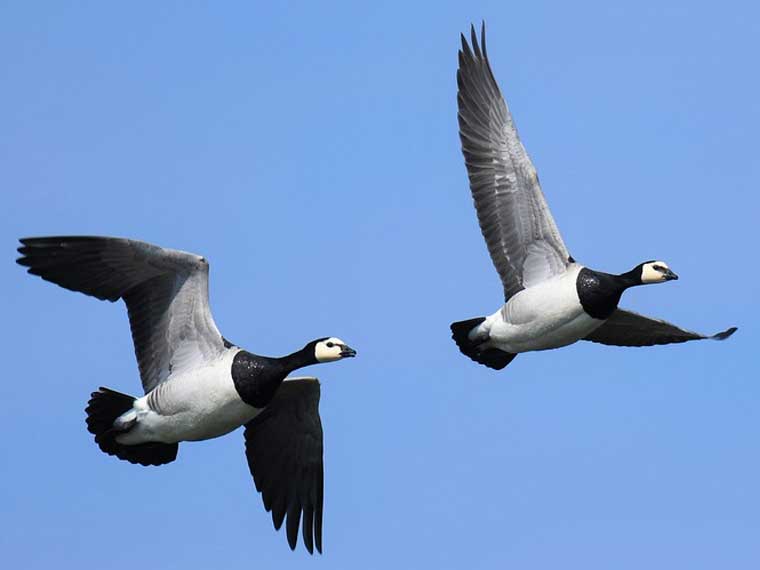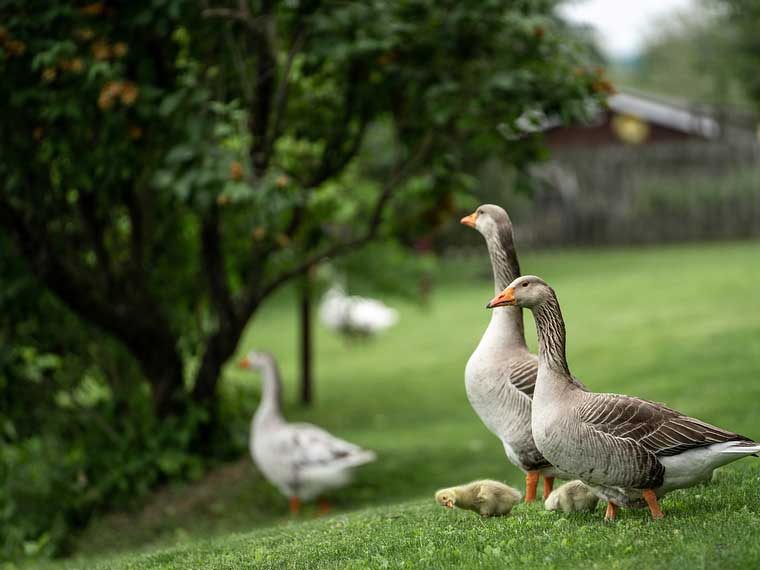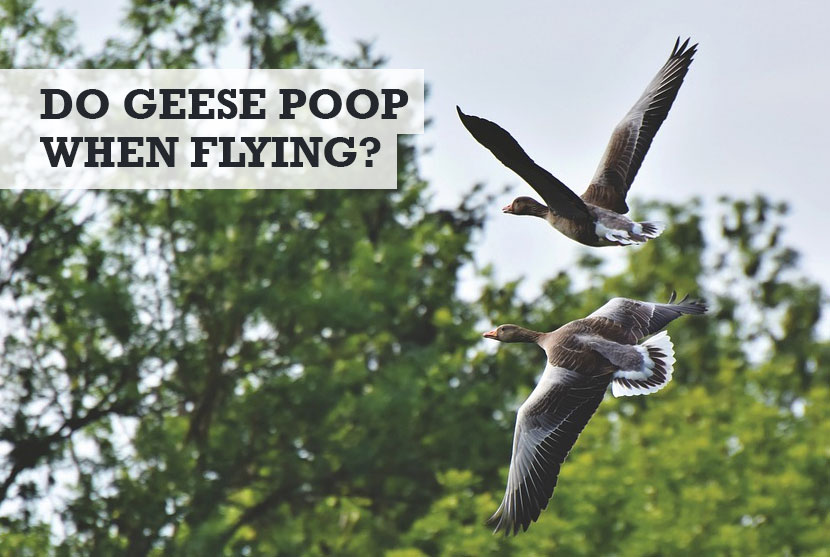I recently read a news article about how a teacher told his pupils that geese don’t poop whilst flying to encourage them out onto the playing fields. Whilst he was probably just saying that to get the kids outdoors, I wondered how much truth there was in it, hence this explainer:
Do geese poop when they fly? Most of the time geese do not poop when flying. Geese are more likely to poop while on ground eating or when walking about. Geese prefer to defecate before they take flight. However, should the need arise, it isn’t unheard for geese to poop when flying.
That’s the short answer, but there’s a bit more to it. If you really do want to know more about why geese rarely poop when flying, read on for the “pooptastic” facts.
Do geese poop in water or on land?
Geese are waterfowl, meaning that they make their home near water in order to survive. They live near streams, lakes, rivers, oceans, or wetland areas. Because they live near water, geese will typically poop on the banks and shorelines of these bodies of water.
So, while geese don’t directly poop in the water, their poop will end up in the water anyway. This is due to rainfall, absorption through the soil, or by the poo getting carried into the water on the feet of the geese and other animals.
It is also quite possible for geese to poop in the water, they are more likely to exit the water when nature calls and poop on land (or in less occasionally, poop when flying).
On the rare occasion a goose might poop while flying, it’s unlikely you will get hit by a poop. Geese tend to fly away from humans, plus at the height they fly, the poop will disintegrate before it gets close to landing on you.
There’s not a very big chance that a person will be surprised by an unpleasant delivery from on high.
If we refer bacl to the school kids’ teacher, after he’d convinced the kids to go outdoors, they probably weren’t hit by any rogue flying goose poop. And not because geese don’t poop when flying, but more likely because it’s rare, and quite a shot if it ever did.
Being attacked by a goose is an entirely different matter though!

Can Canadian geese poop while they are flying?
Just like any other breed of goose, Canadian geese can poop while they are flying. But, the are more likely to take a poop whilst on land.
Do geese poop everywhere?
People who live in areas with a significant goose population will tell you that geese are messy creatures that will poo everywhere. This means pooping whenever and wherever the spirit moves them, including on lawns, driveways, playgrounds.
The bottom (no pun intended) line is that geese will poop everywhere they land.
Handy Hint: Geese will honk during formation flight to communicate with each other. Here’s what the honking means.
Is goose poop toxic to humans?
If you are unlucky enough to be hit by goose poop from the air, you might be worried about the toxicity and dangers. And you would be right to, goose poop can be toxic to humans.
Beyond just being a gross aggravation, goose poop has a high concentration of various bacteria and diseases including Salmonella, Coccidia, Histoplasmosis, Giardia, Campylobacter, Cryptosporidium, Coliform, and E. coli.
Canada Geese, on average, drop between 1 to 1.5 pounds of feces every day! Hosting a population of 20 birds would be the same as having someone spread 20-30 lbs of bacteria contaminated biohazard on your lawn every day. Most people aren’t aware, but these birds can present a real threat to humans and pets alike.
Good Bye Geese blog, “The Hidden Dangers of Goose Droppings”
Goose poop can be hazardous to humans, causing serious health issues, some of which can even be fatal to children and older people since both frequently have weakened immune systems.
Why do Canadian geese poop so much?
Canadian geese, like any other type of geese, consume large amounts of food daily. The goose with a big appetite will eat as much as four pounds of grass a day. After chowing down on so much grub, a goose can easily poop as often as once every 12 minutes!

Just imagine trying to get your turn in the bathroom if you shared your home with a goose! This works out to be around 2 pounds of poop daily.
And make no mistake – these are not tiny and significant little piles of dookie. To put it mildly, Canadian goose poops can’t be missed.
Due to the mess and a threat of disease and bacteria, authorities will often make the choice to close public beaches if there is a large amount of goose poop present – see the video below to show what I mean.
Goose poop is on the large side, and actually looks more like mammal feces than the avian droppings you are used to seeing. It is cigar-shaped and is usually left in a coiled pile.
It is not soft or fluid like most bird poop is; it is solid and typically green, brown, or white in color. You do NOT want to step in a ginormous pile of goose doodie in your bare feet – or at all, for that matter!
Why is goose poop white?
And lastly, what is with the white color you often see in goose poop? Well, the white part of any breed of bird’s poop is not actually all poop. It will be their equivalent to our urine.
But birds, and therefore geese, do not pee like we do. Instead, the emit excess nitrogen by pooping out crystallized uric acid. This is largely solid and comes out as a white paste – so that’s why goose “poop” is white.
Conclusion
Next time you see a flock of geese flying overhead, you might be tempted to take cover to avoid any flying poop. However I would say that the risk of you being hit by goose poop while the bird if flying is very, very slim!
You might also like…
- The average life expectancy of a domestic goose
- Where geese sleep at night could surprise you
- Try to feed a goose at your own risk!
Image in header via https://pixabay.com/photos/wild-geese-gray-geese-goose-birds-4477448/

